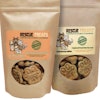
Pet owners, like many consumers, increasingly care about sustainability in the products and brands they buy. Recent surveys indicate the current level of concern in various countries.
In a global consumer lifestyle survey conducted earlier this year by Euromonitor International, 65% of pet owners said they are concerned about climate change and are often more likely than non-pet owners to pursue “green” activities. The survey results, presented by Ekaterina Tretyakova, Euromonitor market research consultant, during Interzoo 2024, also showed that more pet owners in emerging markets are trying to have a positive impact on the environment: 80% of Indian pet owners, followed by 74% in China and UAE, and 72% in Brazil.
Interestingly, far lower percentages of pet owners in developed pet food markets responded in that vein, including 50% in Belgium and Sweden, and 32% in Japan.
How pet owners show sustainability focus
In terms of differences between pet owners and non-pet owners following more sustainable practices, 52% of pet owners are reducing their use of plastics, compared to about 48% of non. Others include recycling items, 50% vs. about 46%; using sustainable packaging, 40% vs. 36%; buying sustainably produced items, 29% vs. about 25%; and reducing meat consumption, 27% vs. about 23%.
The survey also examined types of packaging the respondents consider sustainable, including recyclable (named by 51%), biodegradable (48%), refillable/reusable (39%), paper (36%), made with recycled content (35%), compostable (34%) and bio based/plant based (31%).
Another survey, fielded among 945 pet owners in Canada, France, the U.K. and the U.S., homed in on sustainable pet food packaging. Conducted by Yummypets, an online community for pet lovers, and Pets International magazine, 55% of respondents said they actively seek sustainable packaging (though only 11% said they always do), and 46% reported buying sustainable or recyclable pet food packaging.
There is fairly wide variation among the pet owners from country to country; 17% of U.K. respondents always seek sustainable packaging, with 57% at least sometimes buying sustainable or recyclable packaging. In comparison, only 35% in the U.S. reported such purchasing practices, and 29% of French respondents said they never look for sustainable packaging.
Trusting and paying more for sustainability claims
In the Yummypets survey, 27% of pet owners said they consider sustainability extremely important, 38% found it very important and only 5% deemed it not at all important. By country, 35% of U.S. respondents rate sustainability as extremely important versus 30% in the U.K.; in Canada, 47% consider it very important, while only 18% of French pet owners do.
Specific to pet food, 51% of these pet owners said it being produced by an environmentally friendly company is important or extremely important. At the same time, 65% reported being skeptical of pet food companies’ sustainability claims. In a similar Yummypets survey from 2022, that figure was only 41.7%.
The pet owners globally surveyed by Euromonitor seemed more trusting, with 61% saying they trust “recyclable” claims, 57% “locally sourced” and 54% “environmentally friendly.” While similar percentages — 57% and 55%, respectively — report trusting “organic” and “natural” claims, 14% of these respondents believe such claims are excuses for companies to charge more. That’s worth noting because the price of more sustainable products definitely plays a role in these pet owners’ purchasing behavior. Median prices of pet foods with sustainable claims climbed about 22% in 2023, according to Euromonitor, after a 19.5% rise in 2022 and 17% in 2021.
Thus, unsurprisingly, only 12% to 16% said they’re willing to pay more for pet food labeled as environmentally friendly, sustainably raised or produced, locally sourced or manufactured, or fair trade. And, though U.K. and U.S. pet owners in the Yummypets survey seem more likely to consider sustainability important, similarly low numbers — 11% and 13%, respectively — said they’re willing to pay more for it.
In these inflationary times, asking pet owners to pay a premium for sustainability may be a bridge too far for most of them.


















